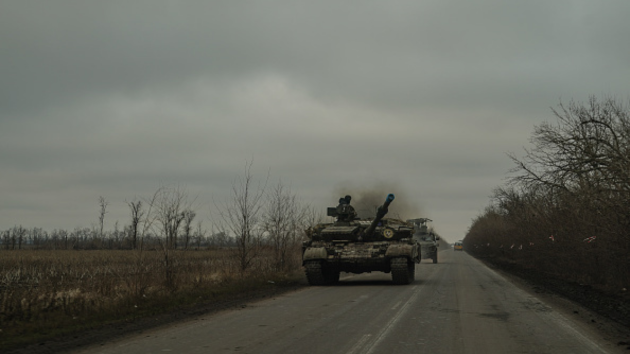‘The worst situation I’ve ever seen’: Aid workers reveal conditions of those living in Gaza
Written by ABC Audio ALL RIGHTS RESERVED on February 28, 2024
(GAZA) — For the last 25 years, pediatrician Dr. John Kahler has participated in humanitarian aid missions around the world from Syria to Haiti to Tanzania.
Despite providing medical services for years, Kahler said treating people in Gaza amid the ongoing Israel-Hamas war is incomparable to the work he’s done in other areas.
“This is just by far the worst situation I’ve ever seen,” he told ABC News. “The desperation is just beyond belief. All the children I saw were sick. All the children I saw were living in the cold, irrespective of whether intended or not.”
As the humanitarian crisis in Gaza grows, aid workers from several organizations have been deployed to help those in the strip and the surrounding area.
Medical staff who have returned from deployments spoke with ABC News about the poor hygiene conditions and inadequate water supply that have led to the spread of infections and diseases, children being disproportionately affected and often seemingly small injuries proving fatal.
Children suffering from breathing problems, intestinal infections
Since the early days of the conflict, women and children have borne the brunt both in mass casualties and in reduced access to health services, according to multiple United Nations agencies.
Kahler is a co-founder of the nonprofit MedGlobal, which has been conducting aid missions in Gaza. At the organization’s clinic in the southern city of Rafah, Kahler said staff saw 600 to 700 patients a day, about 200 of whom were children, mostly under 6 months old.
He said there were outbreaks of respiratory syncytial virus (RSV) that often led to a wheezing illness called bronchiolitis in the youngest patients. He also saw children with breathing problems due to smoke, because fire is the only form of heating for many families living in tents.
“One hundred percent of the children under 6 months of age had a diarrheal illness,” he said. “The vast majority of those children had significant diaper dermatitis and you say ‘diaper dermatitis’ and it sounds relatively benign. But, in this particular situation, with no Pampers access, no clean water access, no hygiene access, In the cold, it can be a very, very difficult situation to deal with.”
His co-worker, Dr. Zaher Sahloul, president and co-founder of MedGlobal and a critical care specialist in Chicago, said he recalled a few children who came into the clinic, one being a 4-year-old girl name Lama.
According to Sahloul, Lama had been living in a tent with 15 other members of her family and had bloody diarrhea. He said Kahler examined her and gave her oral rehydration fluids, which improved her condition.
“Unfortunately, among innocent civilians, especially children, the impact of the war on children is probably something that we haven’t seen, I haven’t seen, in any other place.”
Lack of aid and poor hygiene
Amy Leah Potter, nursing activity manager for the Doctors Without Borders or Médecins Sans Frontières (MSF) emergency team in Gaza, said some of the biggest issues she saw during her month-long deployment were poor hygiene conditions and inadequate water and sanitation.
“The hygiene conditions are deplorable, through no fault of the population,” she told ABC News. “It’s overcrowded, multiple people living in tents; there is no running water, there’s no proper drainage.”
These conditions often lead to sicknesses including gastrointestinal illnesses and skin infections, Potter said.
Potter estimated at the Sinai Peninsula in Egypt, where she crossed into Gaza, there were about 2,000 aid trucks lined up to enter Gaza, but with only about 100 entering per day and some periods with no aid entering at all.
Israel, supported by Egypt, has restricted the movement of goods and people in and out of Gaza since Hamas came to power in 2007. The restrictions have tightened since the war began with Israel saying it is trying to limit Hamas’ access to weapons, officials said.
The United Nations Relief and Works Agency for Palestine Refugees in the Near East (UNRWA) said Israel does not provide enough authorization to deliver sufficient aid and, even when it does give authorization, the fighting makes it difficult to deliver aid.
“This is a desert so there’s no fresh water,” Potter said. “You have to get it from water distribution points, which are just trucks that drive up and then people queue for several hours to try and get water. But if you queue for water, that means you’re probably missing the queue for medicine that day or the queue for food. So you kind of have to make decisions.”
Temperatures in Gaza are also extremely cold. Potter said she was wearing four layers at a time during her first two weeks there. However, most families do not have as many clothes and sleep in poorly constructed tents, exposing themselves to the elements and the risk of smoke inhalation or injuries from the fires used to keep themselves warm.
“Every day it got worse and worse and worse, more and more tents,” Potter said. “When I first came, there were no tents on the beach, because the winds are so strong, you wouldn’t want to put a tent there. By the end [of the month-long deployment], the beach was full. There’s nowhere to put anybody.”
Treating injuries with limited supplies
Dr. Chandra Hassan, a general surgeon in Chicago who volunteers with MedGlobal, worked in Rafah as well as Khan Younis, another city in southern Gaza.
He said he saw many patients with chronic diseases who didn’t have access to medicine. This included diabetic patients who couldn’t get access to insulin and dialysis patients, who usually get dialysis three times a week but were getting dialysis once or twice a week at most.
Staff are often left to treat patients with few supplies and little to no room, Hassan said. One patient Hasan said he remembers very well was a pregnant woman who visited the clinic. Pregnant women and new mothers in Gaza in particular have been facing life-threatening challenges to accessing safe care, putting their health and the health of their babies at risk.
“We saw a six-month pregnant woman, completely dehydrated, and we were resuscitating her on a cold floor,” he told ABC News. “There is no bed, no mattress, nothing. She came to the emergency room because most of the other services are not available.”
Hassan said workers gave her fluids, checked her vital signs and after she reported feeling better, she was discharged. He doesn’t know what happened to her after she left the clinic.
He said he saw many patients with injuries from the war. Many of these wounds were small, about two- or three-millimeters long, but because resources are limited and people are often not able to seek care right away, they caused massive damage and proved sometimes fatal.
“These kind of innocent-looking wounds from these missiles could prove deadly,” he said in reference to one such patient who Hassan said initially received wound care for his injuries. He came back two days later, his condition having worsened and went into cardiac arrest and died.
“In a normal situation, they would have scanned him, admitted him, observed him. So, a lot of these kinds of injuries from the explosions, they are they are deadly immediately or they have bad consequences even with surgery, or sometimes just the delay is too much. It proves to be fatal,” Hassan said.
‘No safe place exists’
Nearly every aid worker interviewed by ABC News mentioned that, in past global conflicts, affected populations have been able to leave.
“In most situations, people who are fleeing conflict are able to seek safety and protection, maybe within their own country or maybe outside of their country,” Dr. Paul Spiegel, director of the Center for Humanitarian Health at Johns Hopkins University, told ABC News. He spent a month in Cairo supporting the UNRWA’s Gaza response. “But in this situation, that so far has not been the case.”
In January, Israeli Prime Minister Benjamin Netanyahu said Israel would not consider the war over until the Philadelphi Corridor, an 8.7-mile-long narrow strip of land that consists of the border area between Gaza and Egypt, was closed.
Earlier this month Netanyahu said that his government was working on a plan to evacuate people from the city of Rafah in anticipation of an expected ground operation there and despite continued concerns about the ground assault from Israel’s allies.
Sahloul and Hassan said that in their past work in Syria and Ukraine, refugees were either able to flee to neighboring countries or move to safer regions within their own country but, in Gaza, they say there is no safe place.
“When you’re wounded, you need good nutrition, you need good rest to recover,” Hassan said. “You need a safe place. None of that exists.”
They added that many Gazans cannot safely seek shelter at hospitals and health care settings because they have been attacked, a violation of international humanitarian law.
Israel has said it has not conducted targeted attacks against hospitals and claims Hamas misuses hospitals — operating inside and underneath them in tunnels and using them as command centers as well as to store weapons. Israel Defense Forces (IDF) has released videos it claims are evidence of Hamas operations. Hamas denies the accusations.
Both Sahloul and Hassan worked in the partially operating hospitals in Rafah, such as Nasser Hospital, and said they did not see any evidence of Hamas operations.
“We have not seen any signs of militarization, any suspects, any guns in the hospital … we have not seen any tunnels,” Sahloul said. “There might be some truth to what the IDF are saying, but we have not witnessed it. And people in the hospitals should not be punished.”
Fears of a ‘complete collapse’
Since the Hamas terrorist group’s surprise attack on Israel on Oct. 7, more than 29,600 have been killed in Gaza and more than 69,000 others injured, according to the Hamas-run Gaza Ministry of Health. In Israel, at least 1,200 people have been killed, according to the Israeli Prime Minister’s Office.
Israeli officials said 576 IDF soldiers have been killed, including 237 since the ground operations in Gaza began.
Additionally, there are about 134 hostages still believed to be in captivity in Gaza, 130 of them related to the current war and four related to the 2014 conflict. Of the 134, at least 32 are believed to be dead, according to the IDF and the Israeli Prime Minister’s Office.
Potter said she believes conditions in Gaza will only further deteriorate and the number of deaths will increase unless a cease-fire is agreed to.
“We’re not even putting a dent in what’s needed,” Potter said. “If we don’t get [more] aid into the country, if the invasion into Rafah continues, and there’s one and a half million people, there’s nowhere left to go. There’s nothing left to do.”
“It is just trying to survive. It’s like it’s a boat with a hole in it and this isn’t the time to fix the boat. This is the time to just bail the water as fast as you can, but they’ve been bailing for months, with no end in sight. And eventually, there’s going to be a complete collapse,” she continued.
Copyright © 2024, ABC Audio. All rights reserved.







